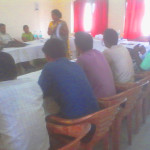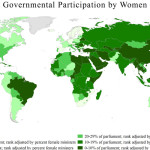Centre for Social Research (CSR) in partnership with the National Human Rights Commission, UN Women and State Police academies held “Gender Sensitization Training of Trainers Programme” from May 5th to May 7th 2015, in Karnataka Police Academy, Mysuru. Gender Sensitization Training is critical to help build a fleet of knowledgeable trainers to ensure that all employees within the police academies are able to have a more holistic understanding of the meanings and implications of gender within a human rights framework. It is critical in this training to have the local support of the senior officers within the police stations, so as to help impart this knowledge on the officers under their care. These trainings have spanned from academies in Haryana, Karnataka and Hyderabad.


This program had thirty participants identified in their respective districts as some of the best individuals to receive this training to then be able to implement it and teach it in their respective districts. The program is based on an interactive, participatory approach to help participants gain the most out of their experience and training. Participation also helps for the soon-to-be trainers to gain a better understanding of the knowledge they are being taught as they can pose questions for clarification. Case studies were utilized throughout the 3 days to help exemplify how situations, such as trafficking or child marriage,may arise and that they may not always be obvious.


Throughout the 3-day endeavor, all participants were given a pre-training form to assess their knowledge and expectations for each day. The first day conducted training on human trafficking and the police methods and modalities commonly utilized when dealing with cases of human trafficking. Dr. P.M Nair was able to help identify common police officer mindsets as he drew upon his own experience as an officer. Dr. Nair stressed the importance of sensitivity when dealing with these topics and how imperative it is to possess: knowledge of issues, skills to understand the issue from the other’s perspective, use of resources like bare acts, handbooks, videos, data, etc., and a change in attitude to not criminalize the victim. There was a large focus upon clear and effective communication to ensure accurate information and to best help the victims.


Following the first day, and everyday of the training, the participants were to fill out a post-training evaluation form to assess the training being delivered. These forms offered a platform for the participants to discuss what they had learned and to receive further clarification if they were unsure of a specific topic. It is a good mechanism for CSR to receive feedback on their program and its effectiveness.
The second day began with a focus on gender conducted by Dr. Rajini R Menon and Ms. PratishthaArora from CSR. They both helped to give more conceptual clarity on defining gender and its ramifications in the real world through institutions such as law, workplace, familial life, etc. There was a focus of the importance of gender and development found within India and in comparison with international indices to showcase areas where India needs to improve in respect to gender and its development. The activity of “Power Walk” was utilized to discuss and breakdown the muddled construct of patriarchy and its ramifications to differing degrees on different bodies. For example, an upper caste man has a different experience with patriarchy than an lower caste man, or upper caste woman. This exercise helps to challenge beliefs about patriarchy and give the participants a visual understanding of the degrees that patriarchy affects individuals.
In the afternoon Ms. Brinda Adige discussed issues in trafficking, child rights and the challenges in rescue and post-rescue operations of trafficking. Ms. Adige’s points worked well in reflection with Dr. Nair’s discussion on trafficking and police recourse. It is necessary when working to rescue women and children in a trafficking case to explain and inform them of what is going on and their rights. Case studies were utilized to bring to bear the atrocities and horrors these children and women endure throughout their trafficking experience.
Mr. SoumyaBhaumik discussed, in depth, the importance and necessity of the Juvenile Justice Act and the Protection of Children from Sexual Offences (POSCO) Act. Utilizing case studies and group discussion Mr. Bhaumik was successful in fostering an environment for learning about legislations that was interactive and beneficial for the participants.
The final day of the training program began with a continuation of a discussion on the POSCO Act. The POSCO Act is gender neutral so as to protect all children from all sexual offences and to not prize a particular gender over the other. Ms. Shanti then began a discussion on child marriage in the next session. It began with a focus on the cultural and traditional beliefs necessarily attached to this topic. Ms. Shanti brought to light the difficulties in navigating parental involvement in these cases as parents believe that marrying their daughter off at a young age, rids them of a burden early. Ms. Adige returned to discuss child labour through an interactive discussion on the various types and practices of child labour found within India. Ms. Adige focused on the necessity to distinguish whether a child enters the labour force out of choice or through force, and if “choice” is possible under legal definitions of a child. Domestic violence and sexual harassment of women in the workplace were topics of discussion and information to help solidify the different natures of threat and abuse that many women face without receiving proper help or police recourse. These discussions helped to expand participants’ knowledge to be able to better identify signs of abuse and to be ambassadors to help these people within their own jobs and communities.
Upon completion of the three-day training, the participants were asked to construct a letter a commitment to themselves based on their new knowledge learned from the training. These letters were given to the CSR team to be mailed out a month after the training as a self check-in point with the participants. The feedback forms provided to CSR contained invaluable information, combined with observations throughout the program, allows for CSR to continually develop and structure such trainings to be as effective and informative as possible. CSR works tirelessly, along with their invaluable partners, to try to create more awareness on issues of gender inequality and how to try and combat them.
Looking forward to reading your blogs, you can mail us your entries at WriteWithUs@csrindia.org, or upload them at Write With Us.
Donation for Centre for Social Research to Join our effort in rehabilitating Domestic Violence
Discuss this article on Facebook




